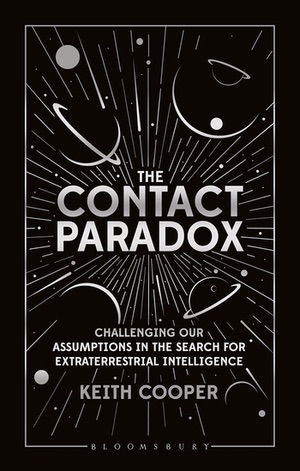Review: The Contact Paradoxby Jeff Foust
|
| “We search, we find, we observe and then we contact,” Cooper concludes. “It’s a unified, scientific and responsible strategy for both SETI and METI.” |
What sort of technosignatures to look for, and how, remain hot topics of debate. For most of modern SETI’s history, dating back to the initial Project Ozma surveys by Frank Drake in 1960, searches for radio transmissions have dominated the field. More recently, though, optical signals and other techniques have emerged. All share something in common, though: none have detected any clear evidence of intelligent life beyond Earth.
In The Contact Paradox, science journalist Keith Cooper examines some of the issues behind that lack of detection. Does it mean life beyond Earth in general is rare, or intelligent life, or just intelligent technological civilizations? Or, does it mean we’re going about SETI the wrong way in terms of what we’re looking for?
Most of the book is a survey of those issues, from topics related to astrobiology in general to ones more closely tied to intelligence, development of technology, and search efforts. Cooper, for example, devotes a chapter to the concept of altruism, which at first glance might not seem relevant to SETI but which he argues is fundamental. “Understanding altruism may ultimately be the single most significant factor in our quest to make contact with other intelligent life in the Universe,” he argues. “It is at the heart at how and why we think other civilisations would transmit a signal for us to detect.”
Most of the book is a review of those issues, but the final chapter he calls for a “new strategy” that “pushes SETI into the mainstream as a key long-term objective for humanity.” He endorses the broader technosignature concept that moves SETI beyond primarily radio-based searches, such as looking for extrasolar planets whose spectra include not just biosignatures but those of industrial pollutants, like chlorofluorocarbons. Promising nearby worlds might be targets for spacecraft like the chip-sized, laser-propelled concepts proposed by the Breakthrough Starshot project, and ultimately transmission like messaging of extraterrestrial intelligence (METI).
“We search, we find, we observe and then we contact,” Cooper concludes. “It’s a unified, scientific and responsible strategy for both SETI and METI.” Language like that in the House NASA authorization bill may be a small step in that direction for tackling one of humanity’s biggest questions.
Note: we are temporarily moderating all comments submitted to deal with a surge in spam.
